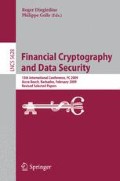Abstract
We present a cryptographic protocol for conducting efficient, provably correct and secrecy-preserving combinatorial clock-proxy auctions. The “clock phase” functions as a trusted auction despite price discovery: bidders submit encrypted bids, and prove for themselves that they meet activity rules, and can compute total demand and thus verify price increases without revealing any information about individual demands. In the sealed-bid “proxy phase”, all bids are revealed the auctioneer via time-lapse cryptography and a branch-and-bound algorithm is used to solve the winner-determination problem. Homomorphic encryption is used to prove the correctness of the solution, and establishes the correctness of the solution to any interested party. Still an NP-hard optimization problem, the use of homomorphic encryption imposes additional computational time on winner-determination that is linear in the size of the branch-and-bound search tree, and thus roughly linear in the original (search-based) computational time. The result is a solution that avoids, in the usual case, the exponential complexity of previous cryptographically-secure combinatorial auctions.
Access this chapter
Tax calculation will be finalised at checkout
Purchases are for personal use only
Preview
Unable to display preview. Download preview PDF.
References
Ausubel, L., Cramton, P., Milgrom, P.: The clock-proxy auction: A practical combinatorial auction design. In: Cramton, P., Shoham, Y., Steinberg, R. (eds.) Combinatorial Auctions. MIT Press, Cambridge (2006)
Porter, R., Shoham, Y.: On cheating in sealed bid auctions. In: Proc. ACM Conf. on Electronic Commerce (EC 2003) (2003)
Parkes, D.C., Ungar, L.H.: Iterative combinatorial auctions: Theory and practice. In: Proc. 17th Nat. Conf. on Artificial Intelligence (AAAI 2000), pp. 74–81 (2000)
Ausubel, L.M., Milgrom, P.: Ascending auctions with package bidding. Frontiers of Theoretical Economics 1, 1–42 (2002)
Parkes, D.C., Rabin, M.O., Shieber, S.M., Thorpe, C.A.: Practical secrecy-preserving, verifiably correct and trustworthy auctions. Electronic Commerce Research and Applications 7, 294–312 (2008)
Rabin, M.O., Thorpe, C.: Time-lapse cryptography. Technical Report TR-22-06, Harvard University School of Engineering and Computer Science (2006)
Bradford, P.G., Park, S., Rothkopf, M.H.: Protocol completion incentive problems in cryptographic Vickrey auctions. In: 7th Int. Conference on Electronic Comemrce Research (ICECR-7), pp. 55–64 (2004)
Brandt, F.: How to obtain full privacy in auctions. International Journal of Information Security, 201–216 (2006)
Franklin, M.K., Reiter, M.K.: The design and implementation of a secure auction server. IEEE Transactions on Software Engineering 22(5), 302–312 (1996)
Harkavy, M., Tygar, J.D., Kikuchi, H.: Electronic auctions with private bids. In: Proc. 3rd USENIX Workshop on Electronic Commerce (1998)
Naor, M., Pinkas, B., Sumner, R.: Privacy preserving auctions and mechanism design. In: Proc. First ACM Conf. on Elec. Commerce, pp. 129–139 (1999)
Lipmaa, H., Asokan, N., Niemi, V.: Secure Vickrey auctions without threshold trust. In: Blaze, M. (ed.) FC 2002. LNCS, vol. 2357, pp. 87–101. Springer, Heidelberg (2003)
Suzuki, K., Yokoo, M.: Secure combinatorial auctions by dynamic programming with polynomial secret sharing. In: Sixth International Financial Cryptography Conference (FC 2002), pp. 44–56 (2002)
Suzuki, K., Yokoo, M.: Secure generalized Vickrey auction using homomorphic encryption. In: Wright, R.N. (ed.) FC 2003. LNCS, vol. 2742, pp. 239–249. Springer, Heidelberg (2003)
Yokoo, M., Sakurai, Y., Matsubara, S.: The effect of false-name bids in combinatorial auctions: New Fraud in Internet Auctions. Games and Economic Behavior 46(1), 174–188 (2004)
Paillier, P.: Public-key cryptosystems based on composite degree residuosity classes. In: Stern, J. (ed.) EUROCRYPT 1999, vol. 1592, pp. 223–239. Springer, Heidelberg (1999)
Pedersen, T.P.: Non-interactive and information-theoretic secure verifiable secret sharing. In: Feigenbaum, J. (ed.) CRYPTO 1991. LNCS, vol. 576, pp. 129–140. Springer, Heidelberg (1992)
ElGamal, T.: A public key cryptosystem and a signature scheme based on discrete logarithms. IEEE Trans. Information Theory IT-31(4), 469–472 (1985)
Rabin, M.O., Servedio, R.A., Thorpe, C.: Highly efficient secrecy-preserving proofs of correctness of computations and applications. In: Proc. IEEE Symposium on Logic in Computer Science (2007)
Abe, M.: Mix-networks on permutation networks. In: Lam, K.-Y., Okamoto, E., Xing, C. (eds.) ASIACRYPT 1999. LNCS, vol. 1716, pp. 258–273. Springer, Heidelberg (1999)
Abe, M., Hoshino, F.: Remarks on mix-network based on permutation networks. In: Kim, K.-c. (ed.) PKC 2001. LNCS, vol. 1992, pp. 317–324. Springer, Heidelberg (2001)
Boneh, D., Golle, P.: Almost entirely correct mixing with applications to voting. In: CCS 2002: Proceedings of the 9th ACM conference on Computer and communications security, pp. 68–77. ACM, New York (2002)
Sandholm, T., Suri, S., Gilpin, A., Levine, D.: CABOB: A fast optimal algorithm for winner determination in combinatorial auctions. Management Science 51(3), 374–390 (2005)
Nisan, N.: Introduction to mechanism design (for computer scientists). Cambridge University Press, Cambridge (2007)
Parkes, D.C., Kalagnanam, J.R., Eso, M.: Achieving budget-balance with Vickrey-based payment schemes in exchanges. In: Proc. 17th International Joint Conference on Artificial Intelligence (IJCAI 2001), pp. 1161–1168 (2001)
Day, R.W., Raghavan, S.: Fair payments for efficient allocations in public sector combinatorial auctions. Management Science (2006)
Cramer, R., Damgård, I., Dziembowski, S., Hirt, M., Rabin, T.: Efficient multiparty computations secure against an adaptive adversary. In: Stern, J. (ed.) EUROCRYPT 1999. LNCS, vol. 1592, p. 311. Springer, Heidelberg (1999)
Wolsey, L.A.: Integer Programming. John Wiley, Chichester (1998)
Author information
Authors and Affiliations
Editor information
Editors and Affiliations
Rights and permissions
Copyright information
© 2009 Springer-Verlag Berlin Heidelberg
About this paper
Cite this paper
Parkes, D.C., Rabin, M.O., Thorpe, C. (2009). Cryptographic Combinatorial Clock-Proxy Auctions. In: Dingledine, R., Golle, P. (eds) Financial Cryptography and Data Security. FC 2009. Lecture Notes in Computer Science, vol 5628. Springer, Berlin, Heidelberg. https://doi.org/10.1007/978-3-642-03549-4_19
Download citation
DOI: https://doi.org/10.1007/978-3-642-03549-4_19
Publisher Name: Springer, Berlin, Heidelberg
Print ISBN: 978-3-642-03548-7
Online ISBN: 978-3-642-03549-4
eBook Packages: Computer ScienceComputer Science (R0)

